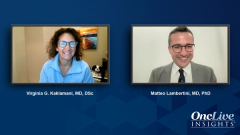
Addressing Chemotherapy-Induced Menopause in Patients With Breast Cancer
Focused discussion on the incidence of chemotherapy-induced menopause in patients receiving treatment for their breast cancer.
Episodes in this series

Transcript:
Matteo Lambertini, MD, PhD:The question is related to chemotherapy-induced menopause, which is not only fatigue but also a lot of other [adverse] effects. Virginia, can you tell us more on these [adverse] effects, how frequent [they are, and] how to counsel these patients receiving different types of chemotherapy regimen?
Virginia G. Kaklamani, MD, DSc: This is where we still need a lot of data because we have to differentiate…between fertility and menopause. Just because a woman wants to have children, even though she might be menstruating, [that] doesn’t mean she’s capable of having children [and] doesn’t mean that her antimüllerian factor is high enough for her to have children. Obviously, just because she’s not menstruating doesn’t mean that she’s in menopause. One of the issues with all these studies that have addressed this is how you differentiate between these, because we haven’t done a good job in our clinical trials in capturing [data about] women who are in menopause or women who are having issues with their fertility. Some of the data look at old chemotherapy regimens [such as] CMF [cyclophosphamide, methotrexate, fluorouracil], and CMF is probably our least favorite when it comes to fertility because in women under the age of 40 [years], we could have up to a 40% chance of amenorrhea. In older women, women over the age of 40 [years, it] might go up to 76%. But when we start looking at other more modern regimens [such as] AC [doxorubicin hydrochloride, cyclophosphamide] and TC [docetaxel, cyclophosphamide], those numbers are probably a little lower. You add a taxane to the AC, and you might have a little more amenorrhea. But amenorrhea doesn’t mean a lot. So that’s one of the things that we need a lot of information on…to address this and…understand a woman’s fertility.
Matteo Lambertini, MD, PhD:On this aspect [of] the type of treatment, we need more data on how to personalize this type of counseling because we know that age is another factor, together with the type of chemotherapy, that matters. We know that the younger [the patient], the lower the risk of developing these [adverse] effects, but this is not always easy to translate into the counseling with the patient we have in front of us. What’s the exact risk for the patient? And this is…the most important part in the oncofertility counseling that we have to discuss because it’s the starting point. The patient should know that there is this risk of developing such [adverse] effects, and those patients who are concerned about the [adverse] effects should be referred then to [a] fertility specialist. This is what we need to do as medical oncologists. We need to do better, especially during the clinical trials, to collect this information and have data to discuss more in detail…the personalized risk of developing chemotherapy-induced amenorrhea. Virginia, if I can ask you on this aspect that you have partially mentioned, but just to have it clearer: Chemotherapy-induced amenorrhea does not always translate into permanent premature ovarian insufficiency, and infertility is something different. So how [do] we interpret [these] data [for] a patient who has just finished chemotherapy or [will finish chemotherapy] a few months later?
Virginia G. Kaklamani, MD, DSc: We know that in many of these women, they will start menstruating again and their ovarian function will improve. It may not go back to what it was prior to chemotherapy, and how transient that amenorrhea is going to be is variable [among] women. Typically, we’ll see those women within a few months of chemotherapy [who] start having some symptoms of menstruating even though it might not be full menstruation. Obviously, you start giving your endocrine therapy such as tamoxifen [Soltamox] in these younger women; that also causes some irregularities in their menstrual cycle. So are there any numbers that you tend to quote, Matteo, when you talk to women about what their risk is of amenorrhea and the risk of infertility with these chemotherapeutic regimens?
Matteo Lambertini, MD, PhD:Yeah, we’ll go back to our guidelines. Both the ASCO [American Society of Clinical Oncology] and ESMO [European Society for Medical Oncology] guidelines have a flowchart to help us in this counseling. The problem is that according to these guidelines, we have 3 different risk categories. So those patients with very high-risk [disease, who are] older women [and] patients receiving many cycles for cyclophosphamide-based chemotherapy, [have] more than [an] 80% chance of developing the [adverse] effect. We have on the other side very young women receiving noncyclophosphamide-based regimen or few cycles of cyclophosphamide-based regimen who have a low risk: less than 10%. But between 20% and 80%, we have this large gray zone that we were discussing earlier where we don’t know very well how to counsel them. We know that it’s an intermediate risk, but between 20% to 80%, it’s a large interval, and it’s where we need to do better in the future, particularly with the new agents that are coming to the early setting.
Virginia G. Kaklamani, MD, DSc: It’s interesting when our fertility colleagues talk about fertility; the age limit is a little different from our discussions. We talk about women younger than 40 [years] or older than 40 [years]. They talk about women younger than 30 [years] or older than 30 [years] and how big that difference is in somebody being able to conceive before the age of 30 [years] and after the age of 30 [years]. So…maybe we’re a little too generous with our numbers, but those are the patients who we see.
Transcript edited for clarity.




































